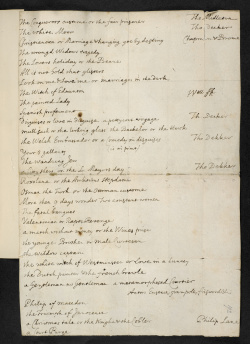Conqueror’s Custom, or The Fair Prisoner
Thomas Middleton? (1626; before 1677)
Historical Records
The only reference to the play occurs in Abraham Hill's list of early plays in manuscript (1677-1703):

- The Conquerors custome or the fair prisoner Tho Middleton
(Adams 73)
Theatrical Provenance
Doris Feldmann and Kurt Tetzeli von Rosador detect "a rather vague chronological order" in Hill's list; since The Conquerer's Custom is at the top of the list, it may be an early play (331).
Probable Genre(s)
Unknown. Feldmann and Tetzeli von Rosador find the title's "double perspective" suggestive of tragicomedy (332).
Possible Narrative and Dramatic Sources or Analogues
Adams finds references to fair prisoners commonplace in titles and plots of the period, as is the word "custom" (80).
Feldmann and Tetzeli von Rosador find the play's title suggestive of a common motif in plays of the 1580s and 1590s: the "Herculean motif of heroic man, warrior or monarch, captivated by beauteous woman, slave or queen". They argue that in these plays (which include The Wars of Cyrus, Tamburlaine, Campaspe, Soliman and Perseda, Edward III and Henry V), the conflict is located within the male protagonist, and the women equated with the castles and countries that the hero conquers. However, they note that Jacobean plays demonstrate a shift away from masculine militarism toward exploring the traditionally feminine values of peacetime (citing Antony and Cleopatra and The False One as examples). They suggest that Middleton's title reflects such a shift, "placing conquerer and prisoner on an equal, alternative footing" (332).
Adams believed that the title was not applicable to any surviving Middleton play (80). However, Feldmann and Tetzeli von Rosador point out that More Dissemblers Besides Women features two conquerers (the returning general Andrugio and the figure of Love), as well as a duchess who voluntarily imprisons herself but then falls in love with Andrugio. However, they acknowledge that these motifs are common ones (332).
References to the Play
Only Hill's list.
Critical Commentary
(see Possible Narrative and Dramatic Sources or Analogues above.)
For What It's Worth
(information welcome)
Works Cited
Site created and maintained by David Nicol, Dalhousie University; updated 9 May, 2011.